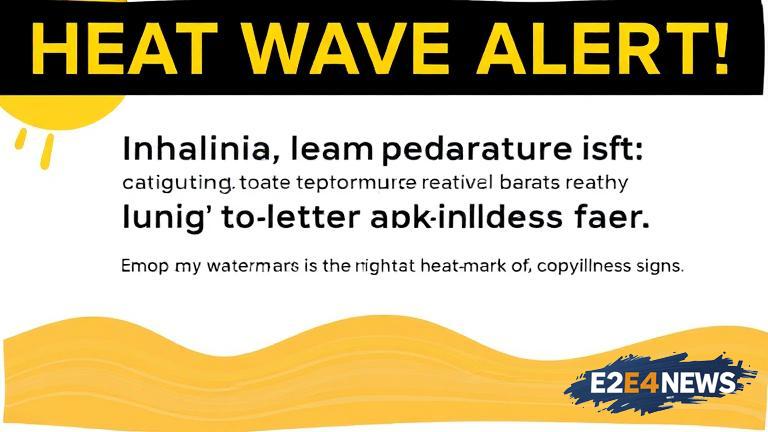As the summer months continue to bring scorching temperatures, the heat index is expected to soar this week, making it feel even hotter than the actual temperature. This can lead to a range of heat-related illnesses, from mild heat exhaustion to life-threatening heat stroke. The heat index, which takes into account both temperature and humidity, is forecasted to reach extreme levels, making it essential for people to take precautions to stay safe. Heat-related illnesses occur when the body is unable to cool itself properly, causing the internal temperature to rise. This can happen when people are exposed to high temperatures for an extended period, especially in areas with high humidity. The elderly, young children, and people with pre-existing medical conditions are particularly vulnerable to heat-related illnesses. It is crucial for individuals to stay hydrated by drinking plenty of water and other fluids, and to avoid strenuous activities during the hottest part of the day. Wearing lightweight, light-colored clothing and staying in air-conditioned spaces can also help to reduce the risk of heat-related illnesses. In addition, it is essential to check on vulnerable neighbors and family members, especially those who may not have access to air conditioning or other cooling measures. The National Weather Service has issued a heat advisory for the region, warning of the potential for heat-related illnesses. As the heat wave continues, it is vital for people to be aware of the signs and symptoms of heat-related illnesses, which can include dizziness, nausea, headaches, and fatigue. If someone is experiencing any of these symptoms, it is essential to seek medical attention immediately. Furthermore, people should be aware of the differences between heat exhaustion and heat stroke, with heat stroke being a more severe and life-threatening condition. Heat stroke occurs when the body’s temperature regulation system is overloaded, causing the internal temperature to rise rapidly. This can lead to brain damage, organ failure, and even death if not treated promptly. In contrast, heat exhaustion is a milder condition that can be treated with rest, hydration, and cooling measures. However, if left untreated, heat exhaustion can progress to heat stroke, making it essential to seek medical attention if symptoms persist. The heat wave is expected to last for several days, making it crucial for people to take precautions and stay informed about the latest weather forecast. By taking the necessary precautions and being aware of the risks, people can reduce their chances of developing heat-related illnesses and stay safe during the heat wave.
